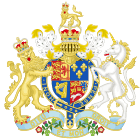Parliament Act 1782 facts for kids
| Act of Parliament | |

|
|
| Citation | 22 Geo. 3. c. 41 |
|---|---|
| Introduced by | The Marquess of Rockingham Leader of the House of Lords (Lords) |
| Territorial extent | Great Britain |
Quick facts for kids Dates |
|
| Royal assent | 19 June 1782 |
| Commencement | 19 June 1782 |
| Repealed | 1868 |
| Other legislation | |
| Repealed by | Revenue Officers' Disabilities Act 1868 |
|
Status: Repealed
|
|
The Parliament Act 1782, also called Crewe's Act, was a law made in Great Britain in 1782. This law was created to stop government workers from voting in elections. The idea was to prevent people from being bribed to vote a certain way.
Contents
What Was the Parliament Act of 1782?
This law was passed by the government led by Rockingham. It was suggested by a person named John Crewe. The main goal of the Act was to stop officials from the Customs and Excise and the Post Office from voting.
Why Was This Act Needed?
In those days, some politicians would use their power to influence voters. This was called "government patronage." They might offer jobs or other favors to get people to vote for them. This was a problem, especially in places called "rotten boroughs."
What Are Rotten Boroughs?
A "rotten borough" was a town that had very few voters but still had the power to elect members to Parliament. This meant that a small number of people could decide who got into power. It was easy for politicians to bribe these few voters. Places like Bossiney and New Romney were examples of rotten boroughs.
What Happened Next?
The Parliament Act 1782 tried to stop this unfair practice. By preventing government officials from voting, the law aimed to reduce bribery. However, the plan didn't work perfectly. Instead of bribing the officials directly, politicians started bribing their family members instead.
The Act was eventually cancelled. It was replaced by a new law, the Revenue Officers' Disabilities Act 1868, in 1868.
See also
- Parliament Act (disambiguation)
 | William L. Dawson |
 | W. E. B. Du Bois |
 | Harry Belafonte |

